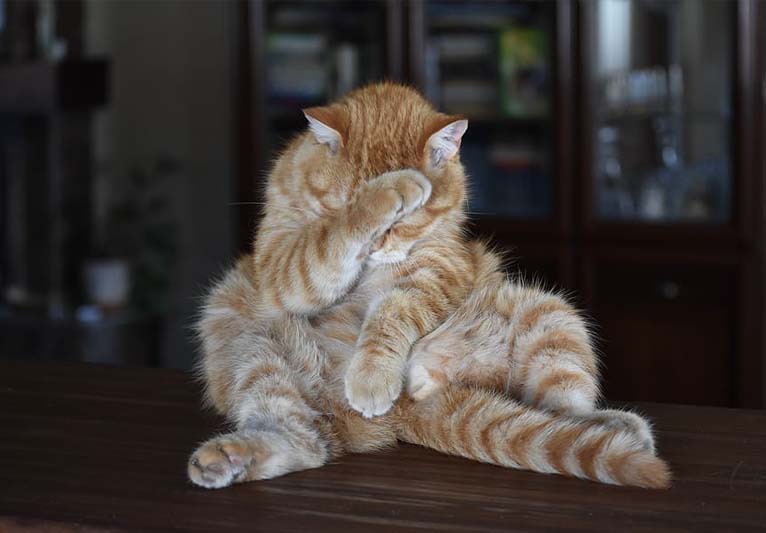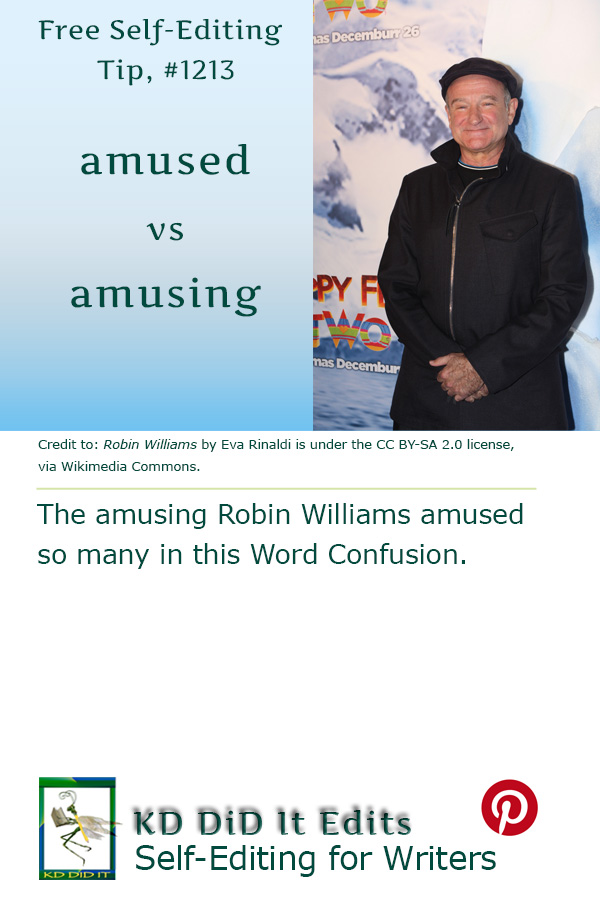Should we find it amusing and therefore be amused at this word confusion amused vs amusing?
Both are adjectives and transitive verbs and yet there is a distinction.
Amused is to be entertained or interested by something.
Amusing is to be entertaining. Like cats, who can be so amusing.
Exploring Later . . .
You may also want to explore “Amuse versus Bemuse“.
Word Confusions . . .
. . . started as my way of dealing with a professional frustration with properly spelled words that were out of context in manuscripts I was editing as well as books I was reviewing. It evolved into a sharing of information with y’all. I’m hoping you’ll share with us words that have been a bête noire for you from either end.
If you found this post on “Amused versus Amusing” interesting, consider subscribing to KD Did It, if you’d like to track this post for future updates.
| Amused | Amusing |
|---|---|

Amused by a VR Headset is in the public domain, via PxHere. |

An Ashamed Kitty is in the public domain, via Pxfuel. — That’s amusing all by itself . . . that any kitty would be “ashamed”, lol. |
| Part of Grammar: | |
| Morpheme: amuse
Adjective; Verb, transitive, Past tense or Past participle |
Morpheme: amuse
Gerund; Verb, transitive, Present participle |
| Adjective: Finding something funny or entertaining Pleasurably entertained Displaying amusement [Usually with a complement] Enjoying humor aspects (of something) Verb, transitive:
To cause mirth, laughter, or the like To cause (time, leisure, etc.) to pass agreeably [Archaic] To keep in expectation by flattery, pretenses, etc. [Obsolete] To engross
To puzzle
|
Adjective: Mildly entertaining
Verb, transitive: To interest or give pleasure to (for a time) |
| Examples: | |
| Adjective: People looked on with amused curiosity. The children chased one another in a circle in front of their amused parents. He was amused to note the disarray of his opponents. He was very amused by the lyrics. She was amused with their antics. The entertainers parodied his speech. He was not amused. Verb, transitive: I was amused at the monkey’s antics. They amused themselves playing cards. She amused the guests with witty conversation. He amused the old ladies with his charms. They amused themselves while they waited. “Miss Manners is amused that a paper invitation is being sent with a computer link on it” (Martin). |
Adjective: “It’s rather like a beautiful Inverness cloak one has inherited. Much too good to hide away, so one wears it instead of an overcoat and pretends it’s an amusing new fashion” (Allingham). “They seem amusing on the first day of Christmas, daft on the second, embarrassing on the third. By the twelfth they’re in landfill. For 30 seconds of dubious entertainment, or a hedonic stimulus that lasts no longer than a nicotine hit, we commission the use of materials whose impacts will ramify for generations” (Monbiot). Walker told the most amusing jokes. The baby’s attempts to talk were amusing. Verb, transitive: “Captain Bonneville now directed his course up along Bear River; amusing himself, occasionally, with hunting the buffalo, with which the country was covered” (Irving). She was amusing the child with a story. |
| Derivatives: | |
| Adjective: amusable, unamusable Adverb: amusedly, unamusably Noun: amusement, amuser |
|
| History of the Word: | |
| Late 15th century, in the sense delude, deceive, from the Old French amuser meaning entertain, deceive, from a- (expressing causal effect) + muser (stare stupidly).
The current senses date from the mid-17th century. |
|
C’mon, get it out of your system, bitch, whine, moan . . . which words are your pet peeves? Also, please note that I try to be as accurate as I can, but mistakes happen or I miss something. Email me if you find errors, so I can fix them . . . and we’ll all benefit!
Satisfy your curiosity about other Word Confusions on its homepage or more generally explore the index of self-editing posts. You may also want to explore Book Layout & Formatting Ideas, Formatting Tips, Grammar Explanations, Linguistics, Publishing Tips, the Properly Punctuated, Writing Ideas and Resources, and Working Your Website.
Resources for Amused versus Amusing
Some of these links may be affiliate links, and I will earn a small percentage, if you should buy it. It does not affect the price you pay.
Allingham, Margery. The China Governess. Originally published 1963. Open Road Media Mystery & Thriller, 2023. <https://amzn.to/48hulkO>. Ebook.
Apple Dictionary.com
Collins, Wilkie. I Say No. Originally published 1884. 2012. <https://amzn.to/3EHocB7>. Ebook.
Dictionary.com: amuse
The Free Dictionary: amusing
Irving, Washington. The Adventures of Captain Bonneville, U.S.A., in the Rocky Mountains and the Far West. Originally published 1843. 2012. <https://amzn.to/46aSeZH>. Ebook.
Martin, Judith, Nicholas Martin, and Jacobina Martin. “Miss Manners: Grandson Graduates But Gets No Gifts.” The Washington Post. 21 May 2021. Accessed 14 Sept 2023. <https://www.washingtonpost.com/lifestyle/advice/miss-manners-ignore-no-gifts-request-but-dont-bring-one-to-the-party/2021/09/12/0d829cea-06cc-11ec-a266-7c7fe02fa374_story.html>.
Merriam-Webster: amuse
Monbiot, George. “Your Gift at Christmas Will Soon be Junk.” The Guardian Weekly. 188, 2. 21 Dec 2012. Accessed 14 Sept 2023. p 24.
WikiDiff: Amusing vs Amused – What’s the difference?
Pinterest Photo Credits
Robin Williams by Eva Rinaldi is under the CC BY-SA 2.0 license, via Wikimedia Commons.


